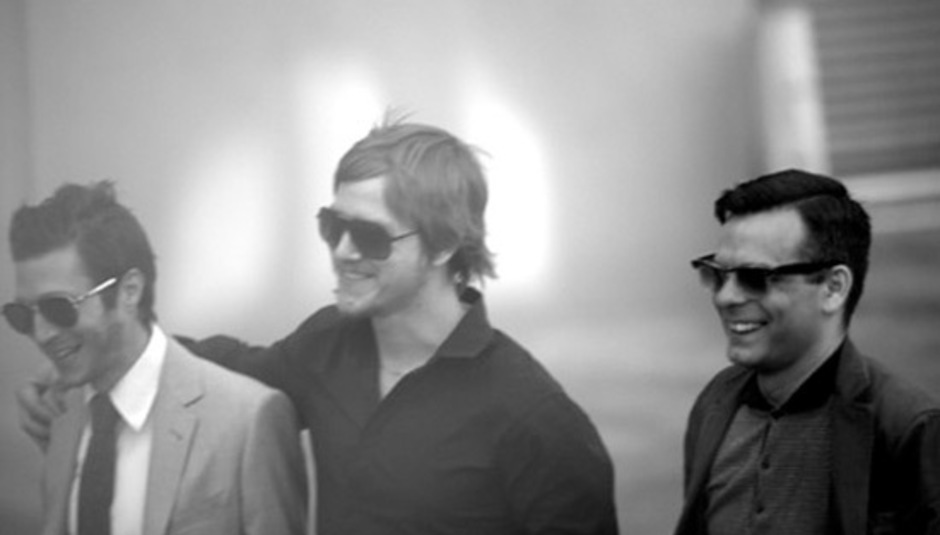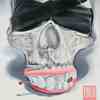As one of the most pivotal outfits to emerge from New York's vibrant underground music scene this past decade, Interpol's legacy is already set in stone. Their 2002 debut Turn On The Bright Lights is highly regarded as one of the most influential post-millennium albums while their almost constant shunning of the media spotlight only adds to the dark mystique that surrounds the band.
Earlier this year, prior to releasing their fourth long player Interpol, they announced that long-serving bass player and undoubted style icon Carlos Dengler was leaving the band to pursue "other projects". In his place, the remaining trio - vocalist, guitarist and main lyricist Paul Banks, fellow guitarist and songwriter Daniel Kessler, and drummer Sam Fogarino recruited a replacement in Dave Pajo, formerly of Slint and last seen working with Billy Corgan in Zwan, while Brandon Curtis of The Secret Machines also joined as a touring keyboard player-cum-backing vocalist.
Currently in the middle of a largely sold out world tour, DiS caught up with the band on both the Nottingham and Birmingham dates of the UK leg. In about an hour the band will soundcheck at the latter's Academy venue. First though, Paul Banks will talk quite frankly about the erstwhile departure of Dengler, the slightly muted critical response to their most recent album and the new lease of life both Pajo and Curtis have brought to the band.
DiS: How's the tour going so far?
Paul Banks: Good, really good. The shows have been a blast actually! It's been really nice, I dunno, maybe with the passing of time in this phase of my life it's been a pretty great experience. We're kind of overwhelmed at the response. There's been shit loads of fans at every show.
DiS: I think it was quite apparent at the Nottingham show on Wednesday that you've built up a loyal fanbase, particularly when you came back on for the encore and opened with 'Untitled', where everyone proceeded to go literally bonkers.
PB: Yeah, it does seem that way. I mean, in the business that we're in you can never take anything for granted so I guess in that way it's quite a privilege to be able to come out on the road again and have a lot of fun. I think it's great too that a lot of our fans have come along with us from the first record, which I don't think many bands today can say to be honest.
DiS: You seem to be playing a lot of songs from your earlier days at the moment - as well as 'Untitled', 'The New', 'Leif Erikson' and 'NYC' have all made regular appearances recently. Are there any songs which you haven't rehearsed or that definitely won't get played on this tour?
PB: There are definitely some songs from the back catalogue that we don't have ready for the road. It's a funny process; we just started playing 'The New' from the first record again - I don't have much of a memory to be honest and I had to listen to it once and then all of a sudden we soundchecked it and I just remembered everything! It kinda seems like it's that way with everybody so...it's really about those guys (Dave) Pajo and (Brandon) Curtis though - they have to learn shit for the first time, so it can be a little more time consuming for them but for the rest of us it's in the old brain bank. It just needs to get jostled a bit!
DiS: How are the two new guys settling in?
PB: Well, it's funny you know. Pajo has just had one of those 33 1/3 books come out Slint's Spiderland, so there's copies of that floating around and I'm taking the piss daily! I'm a huge fan of Slint but it's just so funny to be sharing a room with someone who's just had a book come out about them. It describes how Pajo joined one of his first bands and turned up to rehearsal knowing every song and someone else in the band had to put the phone down to listen to this incredible guy and he's going to the others "This guy is crazy!". That was a bit like Pajo's first rehearsal with us too and we were all going "Oh my God!". He could play everything to perfection. He's such an exceptional bass player with an unbelievable work ethic, and for him to know all of our bass lines was simply incredible. I mean, Carlos' (Dengler) basslines are no simple thing. They're really out there and it takes a really good musician just to understand what is happening let alone be able to execute them like that. He's also an amazing person, really prepared in every way imaginable. Brandon Curtis has one of the most astute musical minds I've ever encountered. Whenever I'm discussing a melody with him he can pick it up in an instant. He's a very sharp musician, almost instinctive even.
DiS: You've probably been asked this umpteen times but without meaning to dwell too much on the past, did Carlos Dengler's departure leave what seemed like an impossible hole to fill at the time and do you ever see yourself working with him again in the future?
PB: I don't know what the future holds but it does leave a big hole because he was a major part of our creative process. A major part. He left after he'd recorded all of his parts for the last record, and we were left with the question of "How are we even going to be able to tour?" and that's something we've now solved. How much will we miss him when it comes to writing new record? That bit remains to be seen. We haven't even broached it yet.
DiS: It must have changed the dynamic in the band somewhat, even to the point of maybe Dave or Brandon writing with you and Daniel (Kessler) in the future?
PB: I don't know the answer to that question but I would say that I couldn't imagine two better people to be in a band with. Sometimes you might work in a studio with people who are amazing virtuosos yet aesthetically or sensibility wise you might not see eye to eye. I was influenced by Dave Pajo's music years before I met him and I was going to watch The Secret Machines back in 2000. These are people who I really admire as artists so from that angle, nothing's out of the question that's for sure.
DiS: I remember seeing The Secret Machines opening for Interpol on the Antics tour six years ago. Had it always been an intention of yours to work with Brandon?
PB: No, not at all. We had a guy that performed the same role as Brandon on the last tour, a guy called Farmer Dave (Scher) from California. He was in this band called Beechwood Sparks and he's something of an international man of mystery and adoration. Everyone in the world seems to know him! He's since moved onto greener pastures too so it just came about that we needed a keyboard player and I came up with the idea of asking Brandon and then Daniel learned of his availability coinciding with this tour so we went straight to him and he agreed to come on board. I guess in a way it was ever so fortunate to be able to think of people like him and Dave and have them be so up for it. I really believe we struck gold on both counts.
DiS: I remember the show in London two months back at Heaven, which I believe was certainly your first show outside of the States with those two guys in the band, yet it felt like you'd been playing together for years.
PB: That's testament to those guys man. They're good.
DiS: Your most recent album, Interpol, was initially one of 2010's most eagerly anticipated records, although a lot of subsequent reviews tended to be fairly lukewarm. How do you respond to such criticisms?
PB: That's great, although I don't know how to put this without it sounding a little strange. I no longer keep my ear to the ground about these kind of things. I just do my work. That's my new approach in that I'm entirely successfully insulated from the press, and I never read internet message boards either. The only people who've told me this are journalists, so in that sense it's wonderful news, but I think it's easier at this stage in my career to focus on work that I believe in and have fun making. There's so much about the criticism and opinion that really interferes with my mojo, to the point where I'm no longer even aware, but that's good. That's good...I had a good feeling about this record, and I was really pleased with the finished product, so its good to know other people were enthused too.
DiS: One of the lyrics on the album's final track 'The Undoing' makes reference to "The place we're in now". Was that a deliberate reference to the direction the band's moving in or simply coincidental with the ensuing line-up changes?
PB: You know, I think that song had a lot of relevance in many ways to be honest. It was quite difficult to finish writing and without meaning to be too cryptic, there's a lot of things surrounding 'The Undoing' that I'd rather not discuss. There are a lot of links within that song to a situation and the sadness which evolved from it. 'The Undoing' was actually Carlos's baby on the record. He really championed it right from when we started making Interpol, and even down to the guitar parts 'The Undoing' has his fingerprints all over it.
DiS: Was it Carlos's idea to sing alternate verses in English and Spanish as well?
PB: No, when it comes down to the lyrics and vocals I've always had total autonomy, but from a musical orchestration point of view, Carlos had the final say with 'The Undoing'. It's quite poignant listening back to it because there were a lot of disagreements around that song when we were making the record. I tried to write a vocal melody and Carlos kept changing parts of he song which meant part of my idea would also need to change to make it fit. In the end, I just decided to leave the vocal part as it was, and I think in hindsight it all kind of worked out pretty well, which again demonstrates what an important factor Carlos was in the creative side of things more than anything.
DiS: A lot of the songs on Interpol seem to depict the break-up of a relationship; I'm thinking of 'Memory Serves', 'Summer Well', and in particular 'All Of The Ways'. Was that the case?
PB: 'All Of The Ways' was definitely...I don't know, without going into too much detail, I find it easy to kind of envisage other people's situations and then project them in a way that amplifies my own life. With that song, there's an area of it that comes across as quite vulnerable and then other parts of it that veer on the pathetic. I wouldn't want to dramatise it as being about me breaking up with someone you know...it's really more about that knowledge that every now and then you can find yourself reduced to desperate needs. I guess the running theme or concept running through Interpol is one of heartbreak whereas on the previous record Our Love To Admire, I think we do come across as being quite arrogant and hedonistic.
DiS: It's interesting hearing you say that about Our Love To Admire, as I've noticed that's one album you're not playing many songs from on this tour.
PB: That's not the reason though. It's not an easy record to replicate live, particularly for the two guys who've recently joined the band, but we are working on it. The main purpose of this tour is to showcase the new record while at the same hopefully playing the songs that people want to hear plus other songs that just flow well as part of a live set. It's like with the new record. There are still a few of the songs on there we haven't quite mastered live, but I'd like to think by the end of this tour the set will be a lot heavier with Interpol material than it is at the present time. It's just a case of trying to find that perfect balance I guess.
DiS: You've recently switched labels from Capital back to Matador, who put out your first two records. What prompted the switch and how different is it working with an independent label to a major?
PB: We had a great working relationship with Capital but then that kind of ran its course, and then when we finished recording Interpol we found ourselves without a label and initially didn't know where we were going to go with it. We started talking to a few people, one of whom was Matador and it just seemed like the obvious choice as we consider the guys who run that label as being some of our best friends. The relationship we built up with them while we were making Turn On The Bright Lights and Antics was pretty strong, and without trying to sound cliched, it kind of felt natural to return home to them one day.
DiS: Your band have been cited by many artists since as being quite influential in the development of New York's music scene this past decade. Do you feel you've been given the same levels of credit and respect by the media?
PB: I don't know, it's hard to say really. I mean, after The Strokes first broke, it became much easier for bands like us to get our music played beyond New York, and I think in that way we helped open many doors...create many opportunities for newer bands who were just starting out around that time. I'm not necessarily talking about bands that were directly influenced by us either, but more about people like Grizzly Bear, who we kind of know through mutual friends. They weren't getting much recognition at the time but I think since the first wave of New York bands came through at the turn of the previous decade, it made it much easier for them to be accepted by a wider audience. Musically, I don't think we've influenced that many people but then when I look around the bands from New York who were around before us, I wouldn't say many of those were a direct influence on our sound either.
DiS: You've seen many changes within the music industry since Interpol started. Would you say it's changed for better or worse?
PB: Oh...I guess it's hard to put a defining "Yes" or "No" answer on that one but if I'm honest I'd say its probably for the worse. I wouldn't like to think we were just starting out now, what with the internet overkill and issues around file sharing that go on, it is almost impossible for bands to be able to finance themselves and make music without the input of a label nowadays. I don't really want to get into the debate of who's to blame and such like, but yeah, its an uphill struggle.
DiS: Finally, last year saw the release of your first record under the solo project guise of Julian Plenti. Will there be a follow up to Julian Plenti Is... Skyscraper?
PB: Yes, most definitely. I've no idea when that will be though as we're going to be touring Interpol well into next year, and I'm not one for writing on the road, but there are plans for another Julian Plenti record in the future.
Interpol's tour continues from now well into 2011, including the following dates...
November
29 Dublin Olympia
30 Dublin Olympia
December
1 Dublin Olympia
3 Manchester Apollo
4 Liverpool University
6 London Brixton Academy
7 London Brixton Academy
8 London Brixton Academy
March 2011
18 Bournemouth Academy
19 Bristol Colston Hall
20 Cambridge Corn Exchange
22 Leeds 02 Academy
For a full list of all dates visit Interpol's official website.






















